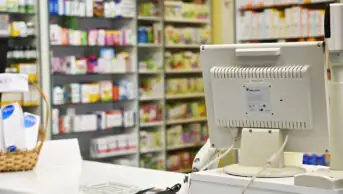HIV is a long-term, chronic condition which is usually only managed by clinical teams in secondary care and antiretroviral (ARV) treatment is usually supplied by hospital pharmacies or homecare companies.
Adherence to ARVs is critical to achieving and maintaining viral suppression, which is acknowledged to be beneficial to the patient by improving overall health, reducing risk of resistance and reducing risk of transmission of HIV infection.
Within NHS Tayside we recognised that there are a group of patients who are difficult to engage and retain in the traditional style of outpatient care due to complex health and social issues. This identified a need for provision of a different model of care in community pharmacy, in particular for, but not limited to, patients already receiving opiate substitute services.
A community pharmacy antiretroviral support service has been developed and approved locally for NHS Tayside, which utilises the relationship that already exists between the patient and the community pharmacy team. This is an innovative approach and the first of its kind within Scotland and we are not aware of any other similar schemes in the UK.
The service has been designed for patients who have been in and out of HIV care over a number of years and have had numerous attempts to adhere to ARV treatment, but have failed at least once. Some have often been lost to routine follow-up care for prolonged periods of time where their health deteriorates.
During the pilot phase we set up the service for a patient who had had varying degrees of engagement with the HIV team over 15 years. ARVs had been initiated many times but, unfortunately, the patient had been difficult to retain in care and never achieved viral suppression. The community pharmacy team, where the patient was receiving methadone daily, were fully supportive and initiated daily supervised administration of ARVs. Viral suppression was achieved within six months and has been maintained for the past three-and-a-half years. The patient’s overall physical and mental health have improved significantly.
The success of the model of care for this patient has lead to the development of the approved local service. This was a collaborative effort between the HIV team, NHS Tayside Pharmacy Service and Area Pharmacy Contractors’ Committee.
Potential patients are identified by the HIV team and patient agreement is obtained to contact their community pharmacy to arrange the service. Before a patient uses the service an individualised document with all the relevant clinical details, medicine choice, adverse reactions, interactions, patient information, counselling points, contact details and ordering details is provided to the community pharmacy team. Obviously community pharmacy access to patient care records would also be beneficial.
The HIV team provides HBP5 prescriptions for the ARVs detailing if the medicines should be supervised daily, dispensed daily or dispensed weekly. Colleagues in the community pharmacy team are asked to contact the HIV team if they have any concerns or patients miss doses or report any adverse effects so the HIV team can provide additional support as required and issues are dealt with quickly. There is a locally agreed remuneration for provision of the service.
One of the greatest challenges to this model of care has been gaining co-operation from the pharmaceutical companies to supply their medicines direct to community pharmacies rather than via our hospital pharmacy. Unfortunately to date we are still trying to arrange direct supply with some of the companies. This certainly creates a barrier for further roll out of the service, which has potential to be used for other patients within our own area and in other parts of the country.
All treatment monitoring is still the responsibility of the secondary care HIV team. However, this model of care has the advantage that patients do not run out of medicines because they have missed an appointment where most patients would collect their prescription.
We have treated six patients by this model of care to date and a further two patients are due to start shortly. All patients on treatment through this model of care have achieved an undetectable viral load. Unfortunately two of these patients have been off treatment for the past six months because they had their opiate replacement stopped and have fallen out of care from the substance misuse service and, subsequently, our own service, though work continues to try to engage them back into care.
We do not suggest that this service provides all the answers to retaining this group of patients in care but it does provide an alternative option and community pharmacy teams can have an integral role in HIV treatment and care.
Kirsteen Hill
HIV pharmacist
NHS Tayside


